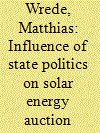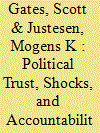| Srl | Item |
| 1 |
ID:
186448


|
|
|
|
|
| Summary/Abstract |
In this paper, we analyze the impact of policy-induced opportunity costs and restrictions on the outcomes of auctions to subsidize ground-mounted photovoltaic (PV) systems in Germany since 2015. First, we examine the incidence of opportunity cost reductions for some suppliers in a simple theoretical auction model. Second, we descriptively study the volumes and prices in PV auctions in Germany. Finally, we analyze a quasi-experiment: the opening of auctions for farmland in disadvantaged areas in some German states from 2017. We show that policy-induced opportunity cost reductions lead to greater success in PV auctions only in the state of Bavaria, which has more generous quantity restrictions and is generally expected to be more supportive of solar power suppliers after 2017. As a result, there is an interregional redistribution in favor of a single state that enables and administratively effectively implements support for disadvantaged areas.
|
|
|
|
|
|
|
|
|
|
|
|
|
|
|
|
| 2 |
ID:
175336


|
|
|
|
|
| Summary/Abstract |
How does armed conflict affect accountability and political trust in democratic governments? To answer this question, we present quasi-experimental evidence based on survey data which, coincidentally, were collected in the days surrounding an unanticipated violent attack by a rebel group in Mali. The chance occurrence of the attack five days into the survey demarcates respondents into two groups surveyed before and after the attack and allows us to examine how the attack affected approval of politicians and trust in political institutions. Our results show that people mainly attribute responsibility to the president and not to parliament or local government, while trust in institutions is largely unaffected. We also show that these effects are strongest in the region of the attack. These findings suggest that voters in new democracies are capable of attributing responsibility to individual politicians and governments while maintaining trust in the fundamental political institutions of democracy.
|
|
|
|
|
|
|
|
|
|
|
|
|
|
|
|